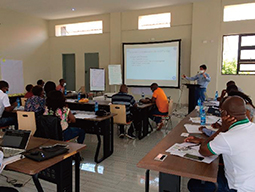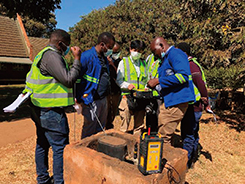Master Techniques from Japan to the World 2
Team Yokohama’s Techniques Help Upgrade Malawi’s Human Resources in the Tap Water Sector
—Solution of the Non-Revenue Water problem and improvement of water supply services—

Mr. Itaya giving guidance on the development of an NRW reduction plan (Photo: JICA)

Mr. Sekimoto providing guidance on technology for detecting underground water leakages (Photo: JICA)
In Lilongwe City, the capital of Malawi, the water demand is increasing due to population growth, but the amount of tap water supplied within the city is not keeping pace with that demand. Furthermore, the proportion of Non-Revenue Water (NRW)*1 is extremely high, which has become a large problem.
For that reason, Japan commenced the “Project for Strengthening the Capacity of Non-Revenue Water Reduction for Lilongwe Water Board” from 2019, in response to a request from the Government of Malawi, and an employee of the Yokohama Waterworks Bureau has been dispatched as one of the JICA experts. Since its first participation in a JICA survey mission in 1977, the Yokohama Waterworks Bureau has offered technical guidance through its employees dispatched to Africa and training in Japan over many years. Its support implemented to date to improve water supply administration in African countries has been highly appreciated both domestically and internationally.
This project implements fact-finding surveys and analyses of NRW, develops effective data-based NRW reduction plans, and provides on-site work guidance for NRW survey methods and reduction, among other efforts, for the Lilongwe Water Board (LWB). In 2020, in response to the spread of COVID-19, the experts had to return to Japan temporarily, however, they conducted a residual chlorine concentration distribution survey*2 as a COVID-19 countermeasure and provided technical guidance remotely based on the survey results. The Government and people of Malawi have high expectations for the project, and in interviews with the residents of the district where this project was implemented, they expressed a desire to reduce water leakages and to use the tap water from LWB rather than well water.
“According to the analysis implemented together with the LWB engineers, NRW accounted for as much as 40% of the total water supplied in Lilongwe, and water leakages accounted for 25%. LWB’s conventional measures only repaired leaks that appeared above ground and it did not have the techniques or equipment to detect water leakages underground. In this project, we are providing guidance on skills for detecting and repairing underground water losses,” said JICA expert Mr. ITAYA Hidefumi from the Yokohama Waterworks Bureau, talking about the situation at the time and the current initiative.
Conducting the work from surveying to repairing together with JICA experts, and sharing the experience on “how to reduce NRW” has served as a valuable guide to the future for LWB. JICA expert Mr. SEKIMOTO Shinichi, who is providing guidance in Lilongwe City said, “The City has hard ground, so laying water pipes underground is difficult, and they are sometimes exposed above the ground, which is the cause of water leakages and water theft. Moreover, there were many issues such as a lack of techniques and equipment for water leakage repairs. During the provision of technical guidance, we have accumulated successful experiences together. As a result, the LWB employees are now getting a new mindset that they can reduce NRW by themselves with their ingenuity.”
“There is no end to initiatives for NRW measures, just as in Japan. For example, even if a water pipe with a water leakage is repaired once, still the pipe will get older, and the number of water leakages will increase again. That is why it is truly important that LWB is able to continue the activities on its own after we return to Japan, and we are currently carrying out the technical transfers while being very conscious of sustainability,” said Mr. Itaya.
The experience and skills of local public entities and other organizations in Japan gained through the accumulation of steady daily efforts are greatly contributing to the improvement of water services and people’s water and hygiene environment in Malawi.
*1 Unbilled water that is caused by water leakage due to aging water supply and distribution pipes, illegal water theft, and faulty water meters.
*2 The survey was implemented because chlorination of the water supply is an effective measure against COVID-19. “Residual chlorine” refers to how the chlorine agent infused for sterilization in the process of making tap water at water purification plants and elsewhere remains in the tap water as chlorine ions. The chlorine ions kill viruses and disease-causing bacteria, so management to ensure that they exist in the tap water at all times is important.
<< Previous Page Next Page >>
Main Text | Reference Statistics | Stories from the Field | Master Techniques from Japan to the World | ODA Topics
